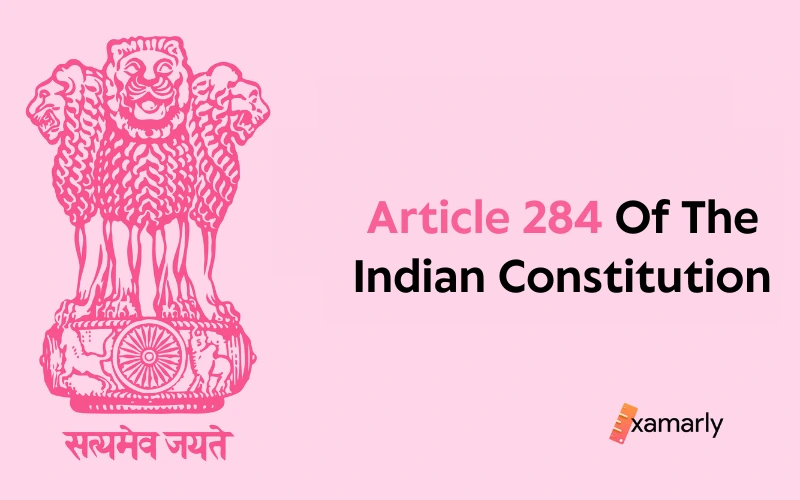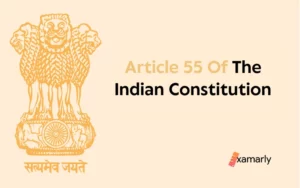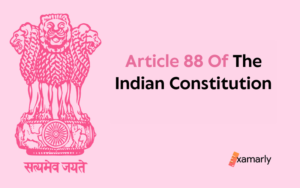An Overview
Does it ever make you wonder what is the fate of the money deposited by suitors in government offices and courts? Or which account does this money get credited into?
Article 284 of the Indian Constitution defines the procedure of the custody of money belonging to suitors by the public servants and courts. This article holds the answers to the above-mentioned questions.
In this blog, we will explore the various provisions of Article 284 in detail and understand its significance in the context of the Indian political system.
- An Overview
- What Is Article 284 Of The Indian Constitution All About?
- Background Of Article 284 Of The Indian Constitution
- Summing Up
- FAQs Related To Article 284 Of The Indian Constitution
- Who Is A Suitor In Legal Terms?
- Which Part Of The Constitution Of India Does Article 284 Of The Indian Constitution Fall Under?
- In Which Chapter Of Part XII Of The Constitution Of India Do We Find Article 284 Of The Indian Constitution?
- How Many Clauses Are There In Article 284 Of The Indian Constitution?
- What Was The Draft Article For Article 284 Of The Indian Constitution?
- Who Suggested The Inclusion Of Draft Article 263A In The Draft Constitution Of India?
- When Was The Proposition To Include Draft Article 263A Made?
What Is Article 284 Of The Indian Constitution All About?
The opening lines of Article 284 of the Indian Constitution suggest that this article holds provisions related to the safe keeping of the suitor’s deposits. The article also contains provisions regarding the money that is received by the courts and the public servants. The article sheds light on the who collects this money and where it is deposited.
Article 284 is composed of two clauses, namely- clause (a) and clause (b). Let us now take a close look at the provisions provided by this article. These provisions are directly quoted from the official text of the Constitution of India.
Custody of suitors’ deposits and other moneys received by public servants and courts.—
All moneys received by or deposited with—
(a) any officer employed in connection with the affairs of the Union or of a State in his capacity as such, other than revenues or public moneys raised or received by the Government of India or the Government of the State, as the case may be, or
(b) any court within the territory of India to the credit of any cause, matter, account or persons,
shall be paid into the public account of India or the public account of State, as the case may be.
These initial lines suggest that the article talks about the money that is received by any government officer or any court or the money that is deposited with them. This means that the provisions of this article provide an insight into the fate of the money of the suitors.
The first clause (a) of the article explains that any government officer who is employed to look into the matters of the Union or of a State, he or she receives money or if any amount is deposited in their care. This is with the exception of funds or money belonging to the public, raised by the Government of India. This amount must be collected in the public account of India or the public account of the State. The same applies to the money raised or received by the Government of the State, as per the case.
The provision mentioned in clause (b) pertains to the management of public funds in India. It states that any money received by or deposited with any court within the territory of India must be paid into the public account of India. This provision applies for any purpose, such as in the course of a legal proceeding or for a specific cause, matter, account, or person. It can even be paid to the public account of the State. This will depend on the jurisdiction of the court.
The public account of India refers to the accounts of the Central government, while the public account of the State refers to the accounts of a State government. The provision essentially means that any money received or deposited with a court in the course of its official duties must be credited to the appropriate government’s public account.
This provision is intended to ensure that the financial transactions of the courts are accounted for and transparent. It also allows the government to have access to and use the money received or deposited with the courts, in accordance with the relevant laws and regulations.
Background Of Article 284 Of The Indian Constitution
Here is a brief history of Article 284 Of The Indian Constitution. This will help in understanding the provisions provided by the article in a clear and concise way.
- On September 9, 1949, the Chairman of the Drafting Committee made a suggestion to insert Draft Article 263A in the document as this clause was left out of the Draft Constitution that was created in 1948.
- It dealt with the management of public funds by the Union government and the State governments in the country.
- According to the provision, any money received by an officer appointed to perform functions related to the affairs of the Union, that is, the Central government or of a State, that is, the State government must be deposited into the accounts of the Union government or of the State government, as the case may be.
- Similarly, any money received by a court must also be deposited into the accounts of the Union government or the State government, depending on the jurisdiction of the court.
- It is important to note that this provision did not include revenue and public money raised by the Union government or the State governments, which would be managed separately.
- The provision seemed to be focused on ensuring that any money received or deposited with an officer of the government or a court in the course of their official duties was properly accounted for and credited to the appropriate government’s accounts.
- Under the proposed provision, money received or deposited in this manner would not form a part of the Consolidated Fund. The Consolidated Fund is a public fund that holds the revenues of the government, including taxes and other receipts.
- However, the provision sought to clarify that such money would form a part of the public account of the Union government and the State governments. This could be utilised according to the appropriation law. The appropriation law refers to the law that authorises the government to incur expenditure from the Consolidated Fund.
- In other words, the purpose of the provision seemed to be to ensure that the Union government and the State governments had the ability to access and use the money received or deposited with officers of the government or courts in accordance with the appropriation law. The provision also intended to ensure that such transactions were accounted for and transparent.
- These suggestions were readily accepted by the Draft Constitution. The Draft Article was made a part of the Constitution of India on the day of its discussion itself.
You Might Also Like:
| Article 283 Of The Indian Constitution | Article 282 Of The Indian Constitution |
| Article 281 Of The Indian Constitution | Article 292 Of The Indian Constitution |
Summing Up
After a thorough reading of Article 284 of the Indian Constitution and analysing the provisions mentioned in its clauses, we can make the following conclusions. They have been listed below:
- Article 284 of the Indian Constitution establishes the rules for the handling of money received by government officers or courts in India.
- Clause (a) of the article states that any money received by a government officer or deposited in their care, must be deposited in the public account of India or the public account of the relevant State. This is with the exception of funds belonging to the public raised by the government.
- Clause (b) states that any money received by or deposited with a court within the territory of India must be paid into the public account of India or the public account of the relevant State, depending on the jurisdiction of the court.
- The purpose of these provisions is to ensure transparency and accountability in the financial transactions of the courts and to allow the government access to and use of the money received or deposited with the courts.
FAQs Related To Article 284 Of The Indian Constitution
Who Is A Suitor In Legal Terms?
A suitor is any person who initiates legal action against another in a court of law. It has the same meaning as that of a plaintiff.
Which Part Of The Constitution Of India Does Article 284 Of The Indian Constitution Fall Under?
Article 284 of the Indian Constitution falls under Part XII of the Constitution of India. This Part of the Constitution goes by the title ‘Finance, Property, Contracts and Suits’.
In Which Chapter Of Part XII Of The Constitution Of India Do We Find Article 284 Of The Indian Constitution?
Article 284 Of The Indian Constitution is a constitutional provision under Chapter I of Part XII of the Constitution of India. Chapter I of this part deals with articles having provisions related to Finances.
How Many Clauses Are There In Article 284 Of The Indian Constitution?
Article 284 Of The Indian Constitution is made up of two clauses. They are clause (a) and clause (b).
What Was The Draft Article For Article 284 Of The Indian Constitution?
Article 284 Of The Indian Constitution was finalised from Draft Article 263A.
Who Suggested The Inclusion Of Draft Article 263A In The Draft Constitution Of India?
It was the Chairman of the Drafting Committee who suggested that Draft Article 263A be added to the Draft Constitution as its provisions were not included before.
When Was The Proposition To Include Draft Article 263A Made?
The Chairman of the Drafting Committee made a proposal to include Draft Article 263A. He did so on September 9, 1949.






